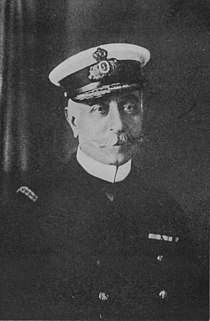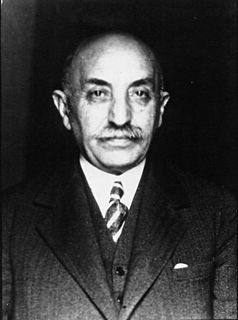
Eleftherios Kyriakou Venizelos was an eminent Greek leader of the Greek national liberation movement and a charismatic statesman of the early 20th century, remembered for his contribution in the expansion of Greece and promotion of liberal-democratic policies. As leader of the Liberal Party, he was elected several times, in total eight, as Prime Minister of Greece, serving from 1910 to 1920 and from 1928 to 1933. Venizelos had such profound influence on the internal and external affairs of Greece that he is credited with being "the maker of modern Greece", and is still widely known as the "Ethnarch".

Georgios Papandreou was a Greek politician, the founder of the Papandreou political dynasty. He served three terms as prime minister of Greece. He was also deputy prime minister from 1950–1952, in the governments of Nikolaos Plastiras and Sofoklis Venizelos and served numerous times as a cabinet minister, starting in 1923, in a political career that spanned more than five decades.

Konstantinos Mitsotakis was a Greek politician who was Prime Minister of Greece from 1990 to 1993. He graduated in law and economics from the University of Athens.
The following lists events that happened during 1920 in Greece.
This article gives an overview of liberalism in Greece. It is limited to liberal parties. The sign ⇒ denotes another party in that scheme. For inclusion in this scheme it isn't necessary so that parties labeled themselves as a liberal party.
Venizelism was one of the major political movements in Greece from the 1900s until the mid-1970s.

Pavlos Kountouriotis was a Greek rear admiral during the Balkan Wars, regent, and the first President of the Second Hellenic Republic. In total he served four times as head of the Greek State, most times in the history of the seat.

Parliamentary elections were held in Greece on 13 June [O.S. 31 May] 1915. The result was a landslide victory for Eleftherios Venizelos and his Liberal Party, winning 187 of the 316 seats in Parliament. Venizelos claimed that his win was proof that the Greek people approved his pro-Allies policy.
The People's Party was a conservative and pro-monarchist Greek political party founded by Dimitrios Gounaris, the main political rival of Eleftherios Venizelos and his Liberal Party. The party existed from 1920 until 1958.

A referendum on the return of King Constantine I was held in Greece on 22 November 1920. It followed the death of his son, King Alexander. The proposal was approved by 99.0% of voters. The antivenizelist parties had recently won the elections of 1920. However the referendum is considered illegitimate by modern Greek historians.

Parliamentary elections were held in Greece on 19 December [O.S. 6 December] 1915. They were boycotted by Eleftherios Venizelos and his party, the Liberal Party, as unconstitutional, a result of a confrontation with King Constantine I over the country's participation in World War I. Venizelos considered Greece as a close and loyal ally of the United Kingdom and France, while Constantine I, who was affiliated with the German royal family, favored neutrality.

The National Schism was a series of disagreements between King Constantine I and Prime Minister Eleftherios Venizelos regarding the foreign policy of Greece in the period of 1910–1922 of which the tipping point was whether Greece should enter World War I. Venizelos was in support of the Allies and wanted Greece to join the war on their side, while the pro-German King wanted Greece to remain neutral, which would favor the plans of the Central Powers.

Parliamentary elections were held in Greece on 19 February 1956. The result was a victory for Constantine Karamanlis and his National Radical Union party by securing the electoral vote despite trailing in the popular vote. It was the first general election in Greece in which women had the right to vote, although women had first voted in a by-election in Thessaloniki Prefecture in 1953 in which the first female MP was elected.

Panagis Tsaldaris was a Greek politician and the 48th Prime Minister of Greece. He was a revered conservative politician and leader for many years (1922–1936) of the conservative People's Party in the period before World War II. He was the husband of Lina Tsaldari, a Greek suffragist, member of Parliament, and the Minister for Social Welfare.

Themistoklis Sofoulis or Sophoulis was a prominent centrist Greek politician from Samos Island, who served three times as Prime Minister of Greece, belonging to the centre-left wing of the Liberal Party, which he led for many years.

Parliamentary elections were held in Greece on 16 December 1923. The result was a victory for the Liberal Party, which won 250 of the 398 seats.

Stefanos Skouloudis was a Greek banker, diplomat and the 34th Prime Minister of Greece.





















